China-Africa Policy Dialogue Forum on AI in Education Held in Beijing
date:2023-11-21 11:02author:adminsource:Smart Learning Instituteviews:
On November 21, the "China-Africa Policy Dialogue Forum on AI in Education" took place in Beijing. The event was jointly organized by the UNESCO Chair on AI in Education at Beijing Normal University and the UNESCO Eastern Africa Multisectoral Regional Office. Policymakers, researchers, educators, and representatives from the private sector in China and African countries engaged in in-depth discussions on how to harness the transformative power of innovative technologies, including artificial intelligence, to drive educational transformation. The event also marked the launch of the "China-African AI in Education Community of Practice" laying a solid foundation for further collaboration between China and African countries.
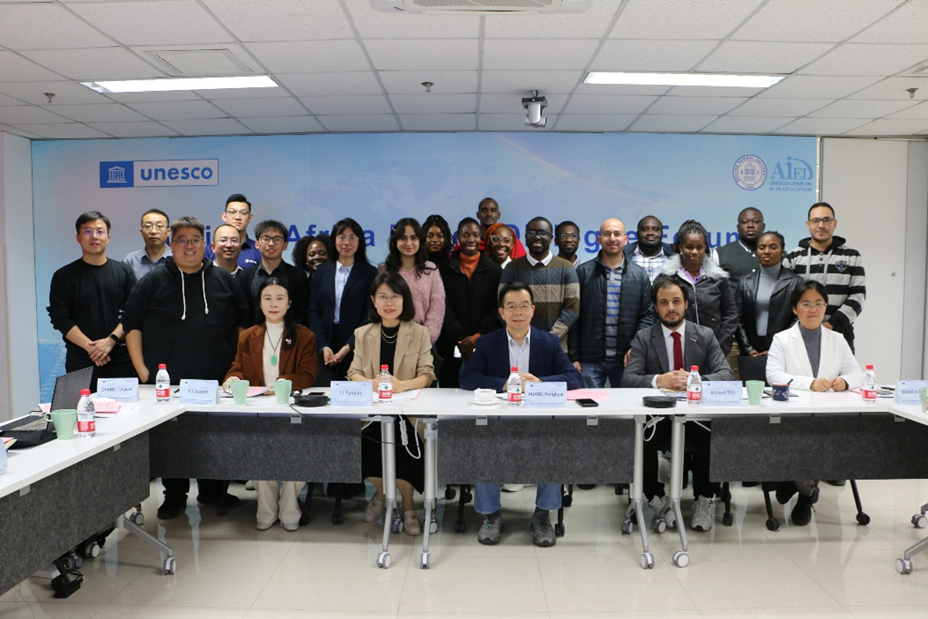 On a global scale, the digital transformation of education, driven by artificial intelligence, has emerged as a pivotal focus in educational reform and development. With the objective of facilitating the recovery of education post-pandemic, tackling the learning crisis in the era of intelligence, achieving Sustainable Development Goal 4 (SDG4) of the United Nations, and aligning with Africa's Vision 2063, the conference aimed to establish an effective platform for communication, fostering dialogue, and promoting collaboration. The primary aim was to catalyze the formulation of pertinent education policies and the exchange of innovative methods, while seeking viable strategies to address various challenges associated with the digital transformation of education. Conducted through a hybrid format that integrated both online and offline elements, the conference witnessed the active participation of nearly 70 experts and representatives.
On a global scale, the digital transformation of education, driven by artificial intelligence, has emerged as a pivotal focus in educational reform and development. With the objective of facilitating the recovery of education post-pandemic, tackling the learning crisis in the era of intelligence, achieving Sustainable Development Goal 4 (SDG4) of the United Nations, and aligning with Africa's Vision 2063, the conference aimed to establish an effective platform for communication, fostering dialogue, and promoting collaboration. The primary aim was to catalyze the formulation of pertinent education policies and the exchange of innovative methods, while seeking viable strategies to address various challenges associated with the digital transformation of education. Conducted through a hybrid format that integrated both online and offline elements, the conference witnessed the active participation of nearly 70 experts and representatives.
In his address, ZHANG Songyun, Deputy Director of the Education Department at the Secretariat of the National Commission of China for UNESCO, emphasized China's high regard for the development of digital education. Referring to the UNESCO Education Transformation Summit held last year, which called for leveraging the digital revolution to benefit public education, Zhang highlighted the significant challenges brought about by generative artificial intelligence, represented by ChatGPT, to educational instruction and knowledge dissemination. These challenges encompass changes in educational paradigms, redefinition of the role of teachers, shifts in student learning approaches, and ethical considerations in artificial intelligence. Zhang underscored the need to reconsider the development of education in the age of intelligence. He acknowledged the efforts of the UNESCO Chair on AI in Education in teaching, research, and innovation in artificial intelligence and expressed the continuous support of the National Commission for UNESCO in promoting educational transformation through artificial intelligence. This support aims to contribute to the development of artificial intelligence and education by aligning with the mission, strategies, and priorities of UNESCO, ultimately fostering educational change in Africa.
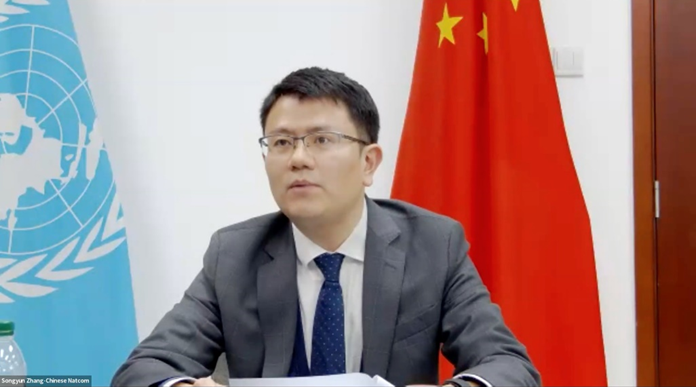 Prof. HUANG Ronghuai, the UNESCO Chair on AI in Education, emphasized that the objectives of this conference align with the UNESCO "Education 2030 Framework for Action" and the responsibilities of the Chair. The goal is to unleash the potential of artificial intelligence in education to achieve effective learning. In the future, the Chair will focus on five areas to promote collaboration between China and Africa in the field of artificial intelligence in education. This includes establishing an Artificial Intelligence and Education Digital Resource Center to facilitate resource sharing, implementing joint training programs to enhance capacity building, organizing webinars to encourage knowledge exchange, initiating joint research projects to address common challenges, and encouraging partners to participate in promoting policy dialogues.
Prof. HUANG Ronghuai, the UNESCO Chair on AI in Education, emphasized that the objectives of this conference align with the UNESCO "Education 2030 Framework for Action" and the responsibilities of the Chair. The goal is to unleash the potential of artificial intelligence in education to achieve effective learning. In the future, the Chair will focus on five areas to promote collaboration between China and Africa in the field of artificial intelligence in education. This includes establishing an Artificial Intelligence and Education Digital Resource Center to facilitate resource sharing, implementing joint training programs to enhance capacity building, organizing webinars to encourage knowledge exchange, initiating joint research projects to address common challenges, and encouraging partners to participate in promoting policy dialogues.
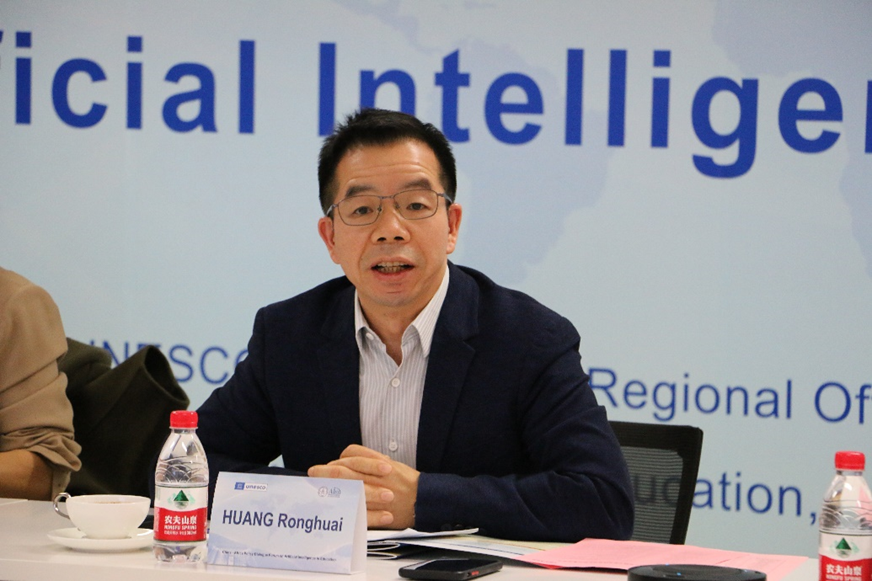 Dr. Alexandros Makarigakis, Director of the UNESCO Eastern Africa Multisectoral Regional Office, attended the conference online and delivered a speech. He pointed out that UNESCO highly values the crucial role of artificial intelligence in promoting educational transformation. He urged member countries to adhere to values and principles in the trustworthy development and use of artificial intelligence, ensuring the prosperous development of AI in the field of education. The conference served as an effective communication platform, allowing both China and Africa to share experiences, jointly assess the potential and threats of artificial intelligence, and evaluate the effectiveness of applications, thereby enhancing education quality and inclusivity. Dr. Makarigakis stated that the UNESCO Eastern Africa Multisectoral Regional Office will continue to support collaboration between member countries and China, aiming to better utilize artificial intelligence to reform education and address issues such as learning poverty and mismatched education supply and demand.
Dr. Alexandros Makarigakis, Director of the UNESCO Eastern Africa Multisectoral Regional Office, attended the conference online and delivered a speech. He pointed out that UNESCO highly values the crucial role of artificial intelligence in promoting educational transformation. He urged member countries to adhere to values and principles in the trustworthy development and use of artificial intelligence, ensuring the prosperous development of AI in the field of education. The conference served as an effective communication platform, allowing both China and Africa to share experiences, jointly assess the potential and threats of artificial intelligence, and evaluate the effectiveness of applications, thereby enhancing education quality and inclusivity. Dr. Makarigakis stated that the UNESCO Eastern Africa Multisectoral Regional Office will continue to support collaboration between member countries and China, aiming to better utilize artificial intelligence to reform education and address issues such as learning poverty and mismatched education supply and demand.
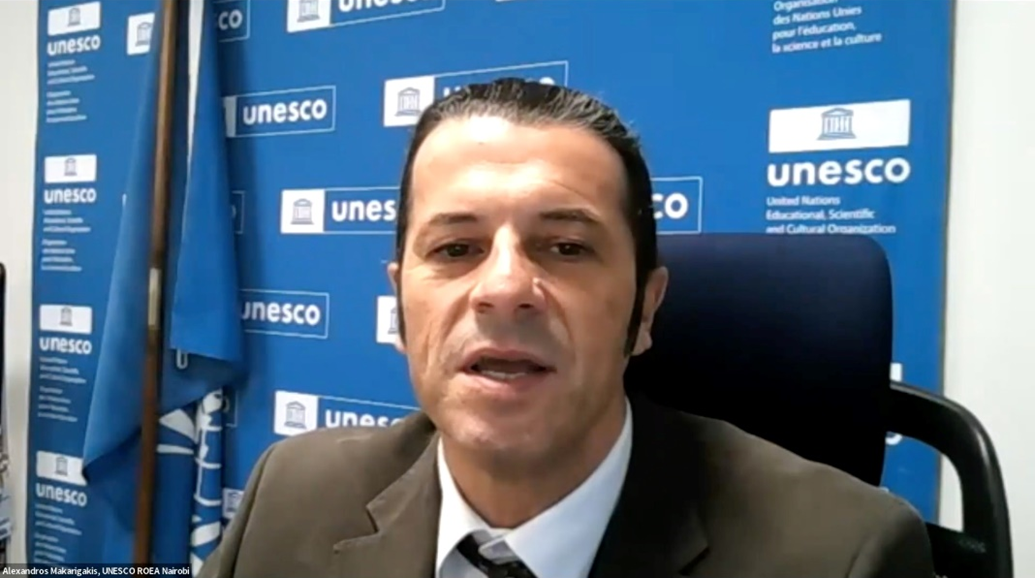 Experts from China, Kenya, Mauritius, Rwanda, Somalia, and Uganda provided introductions to the development of artificial intelligence education in their respective countries, along with relevant policies.
Experts from China, Kenya, Mauritius, Rwanda, Somalia, and Uganda provided introductions to the development of artificial intelligence education in their respective countries, along with relevant policies.
Prof. LI Yanyan from Beijing Normal University shared China's efforts in enhancing the digital literacy and skills of the entire population, as well as promoting the integration of artificial intelligence into education. In 2021, the Chinese government issued the "Action Plan to Enhance Digital Literacy and Skills for All," outlining goals such as enriching the supply of high-quality digital resources, improving the quality of digital life, enhancing efficient digital work capabilities, establishing a lifelong digital learning system, stimulating digital innovation vitality, enhancing digital security capabilities, and strengthening the legal and ethical norms of digital society. The "Information Technology Curriculum Standards for Compulsory Education," released in 2022, incorporates fundamental knowledge and skills in data, algorithms, network security, and artificial intelligence into the teaching system of primary and secondary schools. Prof. LI also introduced China's practices in the field of artificial intelligence and education, including AI textbooks, open educational resources for AI, open algorithms, tools, and datasets, AI laboratories, and an online community for teacher development.
Ms. Anne K. Waweru, a digital transformation expert from Kenya, pointed out the tremendous potential of artificial intelligence in enhancing learning outcomes, promoting educational accessibility, and facilitating personalized education. She introduced intelligent tools currently being used in Kenyan schools, providing valuable examples for the application of AI in education in Africa. Oomesh Gukhool, a senior lecturer at the University of Mauritius, outlined the role of AI in the democratization of education in Mauritius. This encompassed curriculum integration, teacher training, access to educational resources, community involvement, AI education centers, government incentive measures, policies, and regulatory frameworks.
Dr. Claude Migisha, an AI and data governance expert from Rwanda, used his country's education practices as an example to elucidate the roles various stakeholders play in collectively promoting the development of AI and education in Africa. Dr. Husein Osman Abdullahi, the Registrar and Senior Lecturer at SIMAD University in Somalia and the Director of the Somalia Open Knowledge Center, provided an overview of the current status of AI education development in Somalia. The Ministry of Education in the country has introduced information technology courses in basic education and advocates for the use of online platforms as a supplement to traditional teaching methods. He highlighted challenges such as a lack of resources and infrastructure, widening the digital divide, and a shortage of qualified teachers.
Dr. John Okuonzi, Director of Information and Technology Services at Makerere University in Uganda, presented the current application status, issues, and solutions of AI in education in Uganda. He emphasized the importance of ensuring ethical use of AI in education and advocated for training to ensure everyone has fair access to the right to use intelligent technology.
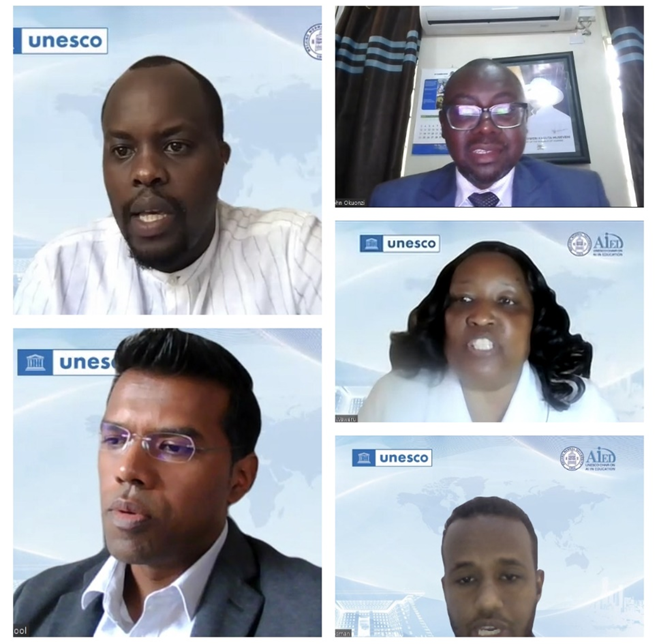 In response to the recommendations of the 2022 Education Transformation Summit, the International Commission on the Future of Education, and Africa's Vision 2063, the UNESCO Chair on Artificial Intelligence and Education, in collaboration with the UNESCO Eastern Africa Multisectoral Regional Office, jointly launched the "China-African AI in Education Community of Practice" during the conference. Ahmed Tlili, Associate Professor at Beijing Normal University and originally from Tunisia, stated, "The community aims to strengthen collaboration between China and African countries to promote the development of AI in education. We will focus on facilitating the exchange of knowledge, research findings, and best practices related to the integration of AI into educational systems. The community aims to enhance capacity building for stakeholders in the field of AI in education, encourage collaborative research to explore the impact and effectiveness of intelligent technologies in different educational settings, advocate for responsible and equitable deployment of AI in education policies, ensure accessibility and inclusivity, nurture vibrant and inclusive communities, and engage members actively in discussions, sharing experiences, and contributing to collective learning." It is reported that the "China-African AI in Education Community of Practice" will establish dedicated working groups and communication channels to facilitate ongoing dialogue, resource sharing, and updates within the community. Invitations will be extended to potential global members to ensure diversity and participation in the community.
In response to the recommendations of the 2022 Education Transformation Summit, the International Commission on the Future of Education, and Africa's Vision 2063, the UNESCO Chair on Artificial Intelligence and Education, in collaboration with the UNESCO Eastern Africa Multisectoral Regional Office, jointly launched the "China-African AI in Education Community of Practice" during the conference. Ahmed Tlili, Associate Professor at Beijing Normal University and originally from Tunisia, stated, "The community aims to strengthen collaboration between China and African countries to promote the development of AI in education. We will focus on facilitating the exchange of knowledge, research findings, and best practices related to the integration of AI into educational systems. The community aims to enhance capacity building for stakeholders in the field of AI in education, encourage collaborative research to explore the impact and effectiveness of intelligent technologies in different educational settings, advocate for responsible and equitable deployment of AI in education policies, ensure accessibility and inclusivity, nurture vibrant and inclusive communities, and engage members actively in discussions, sharing experiences, and contributing to collective learning." It is reported that the "China-African AI in Education Community of Practice" will establish dedicated working groups and communication channels to facilitate ongoing dialogue, resource sharing, and updates within the community. Invitations will be extended to potential global members to ensure diversity and participation in the community.
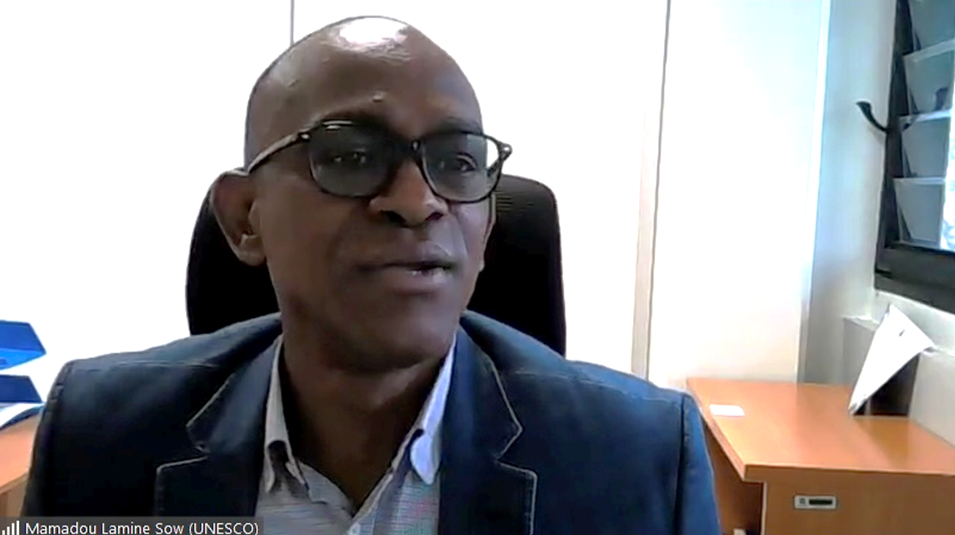 In the concluding remarks of the conference, Mamadou Lamine Sow, Senior Program Specialist at the UNESCO Eastern Africa Multisectoral Regional Office and Head of the Education Department, emphasized the significant role that China plays in promoting the development of artificial intelligence and education in Africa, as well as in enhancing the capabilities of experts. He believes that knowledge exchange and sharing between China and Africa will contribute to a wiser utilization of artificial intelligence, maximizing its benefits while mitigating potential risks. Strategic and enduring collaboration in education between China and Africa is expected to propel the development of education in Africa, seeking common welfare for both parties.
In the concluding remarks of the conference, Mamadou Lamine Sow, Senior Program Specialist at the UNESCO Eastern Africa Multisectoral Regional Office and Head of the Education Department, emphasized the significant role that China plays in promoting the development of artificial intelligence and education in Africa, as well as in enhancing the capabilities of experts. He believes that knowledge exchange and sharing between China and Africa will contribute to a wiser utilization of artificial intelligence, maximizing its benefits while mitigating potential risks. Strategic and enduring collaboration in education between China and Africa is expected to propel the development of education in Africa, seeking common welfare for both parties.
This forum received support from the National Commissions for UNESCO in countries including Kenya, Mauritius, Rwanda, Somalia, Tanzania, Uganda, South Sudan, and others. Representatives from education departments, research institutions, schools, and businesses from these countries participated in the forum through online means. Representatives and researchers from the Smart Learning Research Institute at Beijing Normal University, Beijing Institute of Education, as well as professionals from companies such as Alibaba Cloud, NetDragon Websoft, Squirrel AI, Jiuqi Software, Yuanfudao, Jixing International, and others also attended the conference.

In his address, ZHANG Songyun, Deputy Director of the Education Department at the Secretariat of the National Commission of China for UNESCO, emphasized China's high regard for the development of digital education. Referring to the UNESCO Education Transformation Summit held last year, which called for leveraging the digital revolution to benefit public education, Zhang highlighted the significant challenges brought about by generative artificial intelligence, represented by ChatGPT, to educational instruction and knowledge dissemination. These challenges encompass changes in educational paradigms, redefinition of the role of teachers, shifts in student learning approaches, and ethical considerations in artificial intelligence. Zhang underscored the need to reconsider the development of education in the age of intelligence. He acknowledged the efforts of the UNESCO Chair on AI in Education in teaching, research, and innovation in artificial intelligence and expressed the continuous support of the National Commission for UNESCO in promoting educational transformation through artificial intelligence. This support aims to contribute to the development of artificial intelligence and education by aligning with the mission, strategies, and priorities of UNESCO, ultimately fostering educational change in Africa.



Prof. LI Yanyan from Beijing Normal University shared China's efforts in enhancing the digital literacy and skills of the entire population, as well as promoting the integration of artificial intelligence into education. In 2021, the Chinese government issued the "Action Plan to Enhance Digital Literacy and Skills for All," outlining goals such as enriching the supply of high-quality digital resources, improving the quality of digital life, enhancing efficient digital work capabilities, establishing a lifelong digital learning system, stimulating digital innovation vitality, enhancing digital security capabilities, and strengthening the legal and ethical norms of digital society. The "Information Technology Curriculum Standards for Compulsory Education," released in 2022, incorporates fundamental knowledge and skills in data, algorithms, network security, and artificial intelligence into the teaching system of primary and secondary schools. Prof. LI also introduced China's practices in the field of artificial intelligence and education, including AI textbooks, open educational resources for AI, open algorithms, tools, and datasets, AI laboratories, and an online community for teacher development.
Ms. Anne K. Waweru, a digital transformation expert from Kenya, pointed out the tremendous potential of artificial intelligence in enhancing learning outcomes, promoting educational accessibility, and facilitating personalized education. She introduced intelligent tools currently being used in Kenyan schools, providing valuable examples for the application of AI in education in Africa. Oomesh Gukhool, a senior lecturer at the University of Mauritius, outlined the role of AI in the democratization of education in Mauritius. This encompassed curriculum integration, teacher training, access to educational resources, community involvement, AI education centers, government incentive measures, policies, and regulatory frameworks.
Dr. Claude Migisha, an AI and data governance expert from Rwanda, used his country's education practices as an example to elucidate the roles various stakeholders play in collectively promoting the development of AI and education in Africa. Dr. Husein Osman Abdullahi, the Registrar and Senior Lecturer at SIMAD University in Somalia and the Director of the Somalia Open Knowledge Center, provided an overview of the current status of AI education development in Somalia. The Ministry of Education in the country has introduced information technology courses in basic education and advocates for the use of online platforms as a supplement to traditional teaching methods. He highlighted challenges such as a lack of resources and infrastructure, widening the digital divide, and a shortage of qualified teachers.
Dr. John Okuonzi, Director of Information and Technology Services at Makerere University in Uganda, presented the current application status, issues, and solutions of AI in education in Uganda. He emphasized the importance of ensuring ethical use of AI in education and advocated for training to ensure everyone has fair access to the right to use intelligent technology.


This forum received support from the National Commissions for UNESCO in countries including Kenya, Mauritius, Rwanda, Somalia, Tanzania, Uganda, South Sudan, and others. Representatives from education departments, research institutions, schools, and businesses from these countries participated in the forum through online means. Representatives and researchers from the Smart Learning Research Institute at Beijing Normal University, Beijing Institute of Education, as well as professionals from companies such as Alibaba Cloud, NetDragon Websoft, Squirrel AI, Jiuqi Software, Yuanfudao, Jixing International, and others also attended the conference.

